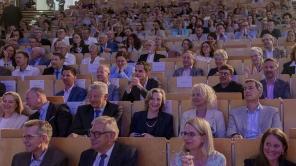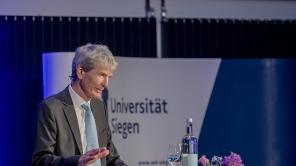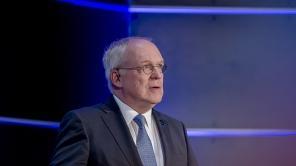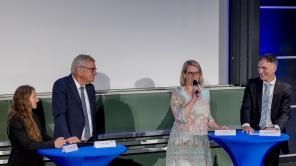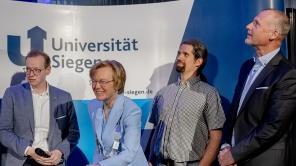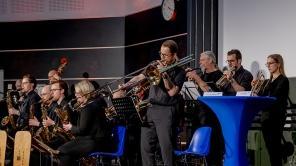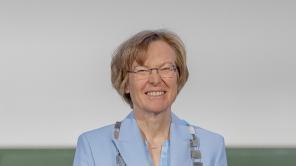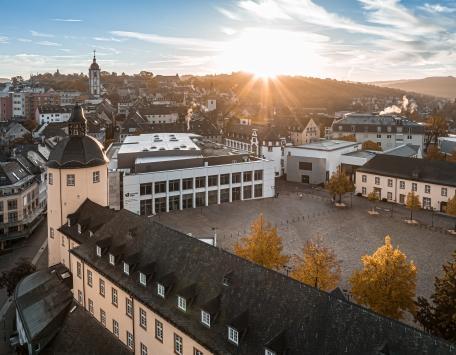New culture of togetherness
A new Rectorate, a new Chancellor, a new strategy. Prof. Dr. Stefanie Reese has now been in office as Rector of the University of Siegen for 500 days, and a lot has happened during this time. The annual reception in the Audimax on the Adolf-Reichwein-Straße campus was therefore an opportunity to look back and forward. But it was also an occasion to celebrate, and the guests were treated to a varied, entertaining and informative program, which was hosted by Stefan Fuckert, journalist and graduate of the University of Siegen.
500 days - after this time, Stefanie Reese is no longer "the new girl", but as Rector at the University of Siegen, she has been able to set an example and embark on a path characterized by openness and participation. This "new culture of cooperation" was also praised by Prof. Dr. Nikolaus Risch, Chairman of the University Council, in his welcoming speech. The fact that the University of Siegen has a Rector in Stefanie Reese who combines academic quality and management skills is a great stroke of luck, he said. The "external perspective that she has brought with her is good for the university, emphasized Risch. It was also the Chairman of the University Council who presented the Rector with the chain of office on this occasion. The insignia is stylish, beautiful - and heavy. "You will wear it with honor," said Risch.
NRW Science Minister Ina Brandes emphasized in her video greeting that the 500 days were just the beginning of a successful collaboration. "I am a big fan of South Westphalia, because the people here are reliable and get stuck in, just like you Ms. Reese."
In her speech, Rector Prof. Stefanie Reese emphasized that these 500 days have been a time of building. The new Rectorate team was formed, Vice-Rectors were elected, thus strengthening structures and setting new priorities. She is delighted that Iris Litty will strengthen this team in future as the new Chancellor: "Ms. Litty was elected in the first round of voting, and unanimously - a fantastic result."
In terms of content, a key issue is the development of the "Strategy 2025+". The task now is to boldly set new priorities in research, teaching and organization together with the faculties, university committees and service facilities. "Let us continue on this path together - with courage, openness and the firm will to make the University of Siegen an even stronger, visible and future-oriented university," said Prof. Reese.
According to the Rector, research and teaching must continue to focus on areas of excellence. The Cluster of Excellence application in particle physics, future projects such as "Circular E-Cars", the "Next Energy Campus" and the INCYTE research building, which will soon be ready for occupancy, are examples of the innovative spirit at the University of Siegen. In the competition for students, the aim is to continue to work on the attractiveness of the courses on offer in the future. "Our aim is to provide our students with the best possible support on their educational path and to help them achieve their individual goals," explained Stefanie Reese.
Prof. Dr. Manfred Curbach (TU Dresden), winner of the 2016 Future Prize, looked beyond the region with his keynote speech on "The New Building. Necessity and opportunity". In a magnificent lecture that captivated the auditorium right up to the last row, he spoke about the enormous contribution of the construction industry to global CO2 emissions and the urgency of researching solutions. In contrast to the early decades of the 20th century, when modern buildings crowned the front pages of newspapers, research in construction today struggles with a niche existence. Only 1.57 percent of the German Research Foundation's funding goes into this important field.
"New concrete can be a savior," said Curbach. The civil engineer showed examples of successful constructions using carbon concrete, a lightweight, low-emission material that he is working on at TU Dresden. However, the scientist emphasized that this is only one piece of the mosaic. "We need more new ideas - and we need them urgently."
And how do you attract students and potential employees to Siegen, or rather to the South Westphalia region? Moderator Fuckert put this question to marketing professor Dr. Hanna Schramm-Klein, Freudenberg's mayor Nicole Reschke, entrepreneur Arndt G. Kirchhoff and Prof. Dr. Benjamin Butz, Head of Micro- and Nanoanalytics, in a panel discussion.
They all agreed that the first step was to get rid of age-old clichés such as the fact that it always rains in Siegen and to emphasize the social and economic strength of the region. "Families can live well here," said Nicole Reschke. Not only because of the beautiful landscape, but also because there is affordable housing, good schools and a lively club culture. All of this, Hanna Schramm-Klein agreed, describes stability. "That's what most people are looking for, and that's what the region offers."
As far as the university is concerned, Prof. Butz said that it scores points for competitiveness and the goal of world-class standards. "We are on the right track here." The many strong and innovative companies in the region are important for the university. Conversely, research and graduates are of great importance to industry, emphasized Kirchhoff. "Nevertheless, we have to do something about the infrastructure," he warned politicians.
After the official program, which was given a rousing musical accompaniment by the University Big Band under the direction of Martin Reuthner, the guests had the opportunity to engage in personal exchange and discussion.
